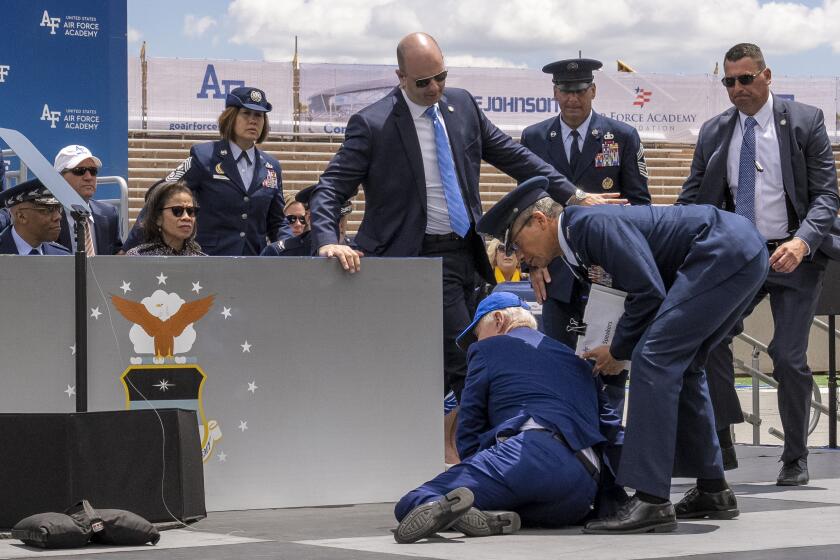Gun control back as a campaign issue
- Share via
WASHINGTON — Ten years ago, when a man with a pistol shot seven tourists on the observation deck at the Empire State Building, New York Mayor Rudolph W. Giuliani responded with an unequivocal call for more federal gun control.
“The United States Congress needs to pass uniform licensing for everyone carrying a gun. Congress must do more,” said Giuliani, then a leading proponent of gun control.
This week, presidential candidate Giuliani reacted to the Virginia Tech massacre in a very different way: with an expression of grief.
“My thoughts and prayers continue to be with the survivors and the many friends, colleagues and family members of those who perished,” Giuliani said in a statement.
Powerful events like the shootings in Blacksburg often turn out to be pivotal tests for the nation’s leaders, and can influence voter attitudes in unpredictable ways, according to political analysts.
The Virginia Tech rampage is likely to focus attention on one of the most emotional issues in modern politics -- gun control -- at a key moment in the 2008 presidential campaign.
The candidates canceled their scheduled public events Tuesday. Giuliani was to have campaigned in Virginia and Maryland.
Most, like Giuliani, expressed sympathy over the events at Virginia Tech. Illinois Sen. Barack Obama, a Democrat, spoke of the need to address violence in America’s culture.
Alone among the major Republican contenders, Sen. John McCain (R-Ariz.) coupled a statement of grief with a reaffirmation of his support for the 2nd Amendment’s right to keep and bear arms.
“This brutal attack was not caused by, nor should it lead to, restrictions on the Second Amendment,” he said.
McCain’s relatively consistent opposition to gun control may win him conservative votes in the Republican primaries.
But it hasn’t gained him the support of politically powerful gun groups, such as the National Rifle Assn., which have criticized him bitterly over the years, particularly over his efforts to curb special-interest money in politics.
The NRA and other gun-ownership organizations have problems with the other Republican contenders too, to say nothing of the Democratic candidates.
Former Massachusetts Gov. Mitt Romney, once known as a gun control advocate, joined the NRA as a “lifetime” member last summer as he was gearing up his Republican presidential run.
However, in his 2002 campaign for governor, Romney vowed not to “chip away” at his state’s strict regulation of guns, and his shift is often cited as part of a broader move to the right on social questions, including abortion.
Giuliani, a prominent gun control advocate for two decades, regularly criticized Florida and other Southern states for making it easier to buy a gun than to get a driver’s license. Today, he says states should be left to decide what their gun laws should be.
With voters just getting acquainted with the presidential candidates, increased attention to the gun issue could “fill in some of the blanks on some of these candidates,” said Nelson Warfield, a Republican campaign consultant.
The Democratic presidential contenders, and particularly Sen. Hillary Rodham Clinton, are widely seen as supportive of stricter federal gun laws. An exception: New Mexico Gov. Bill Richardson, who won praise from gun owners for backing a state law that requires the issuance of concealed-weapons permits to adults who pass a background check and take a gun-safety class.
Despite their past support for tougher gun regulations, Democratic candidates might not be eager to promote that issue in the ’08 election.
Vice President Al Gore’s 2000 defeat was blamed, in no small part, on his support for more gun control.
Last fall, Democrats took notice when Jim Webb was elected to the Senate from Virginia after wooing rural voters as a strong 2nd Amendment supporter and handgun enthusiast.
More to Read
Get the L.A. Times Politics newsletter
Deeply reported insights into legislation, politics and policy from Sacramento, Washington and beyond. In your inbox twice per week.
You may occasionally receive promotional content from the Los Angeles Times.










